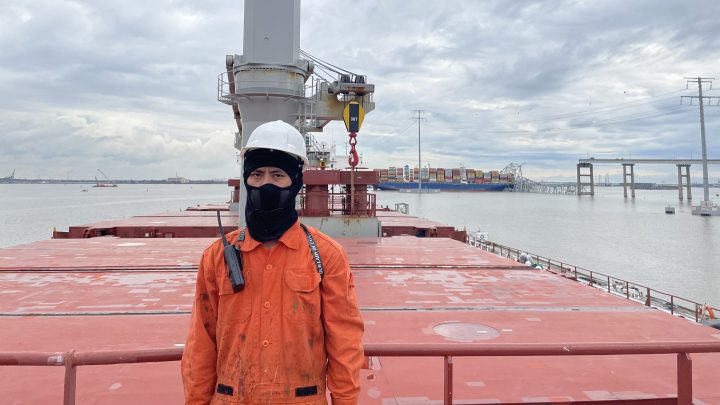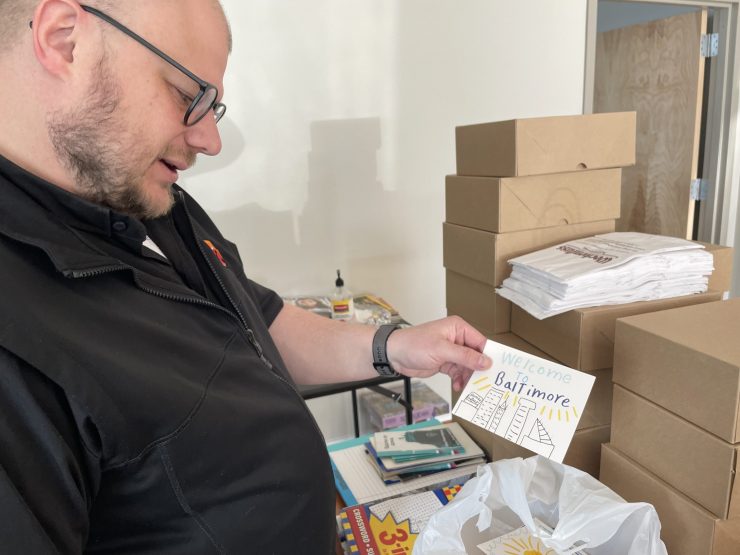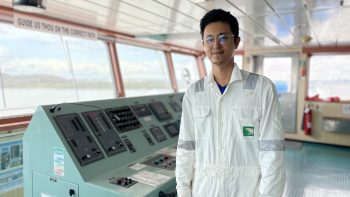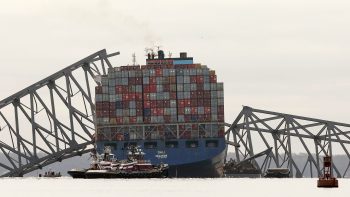
Aboard stranded cargo ships in Baltimore’s port, a fight against “tedium”
Aboard stranded cargo ships in Baltimore’s port, a fight against “tedium”

Just over a week after the collapse of the Francis Scott Key Bridge in Baltimore, Coast Guard crews have opened a second temporary channel in the river so that a very limited amount of ship traffic can pass through.
But the crews of eight large cargo ships, including the Dali, are still stuck in the Port of Baltimore. And that means their 159 crew members — used to being on the move — are stuck too. (On tonight’s episode of “Marketplace” we’ve got an interview with the workers themselves.)
At the Baltimore International Seafarers’ Center, port chaplain Joshua Messick is gathering his supplies for the day: coffee and chocolate. “It’s nice to come bearing gifts,” he said.
Messick is bringing the treats to the crew of the Phatra Naree, a Thai cargo ship that’s docked just a short distance from the collapsed Key Bridge, that’s now stuck in Baltimore indefinitely. And it’s part of Messick’s job to take care of the crew members on the ships there.
“They’re the men and women that move the world,” he said. “And they go unseen quite frequently, unnoticed and, honestly, unappreciated.”
Messick drives his 10-passenger van to the terminal, parks and climbs up the metal gangway to the ship. The ship delivered aluminum here, and Captain Prachya Prengsieng said now they’re just sitting tight.
“We have no choice. We just do whatever we can,” he said.
And what they can do is maintenance, like checking the engine and the power systems on the ship. Everyone on here is on a six- or nine-month contract; they’re getting paid even if the ship’s docked and there’s less to do.
When I was with him, Messick drove 8 of the crew members to a shopping mall. The ship’s chief engineer Pisit Thammakanjanawilai said he needs “to buy some food and drinks.”
“Am I taking you to the liquor store too?” Messick asked. “Yes,” Thammakanjanawilai responded.
It’s Thammakanjanawilai’s 37th birthday on Monday and they need to stock up. Yet only about half of all seafarers currently stuck in Baltimore have visas to go ashore, by Messick’s estimate. And he worries about them.

“Their tasks are limited. There’s only so much to be done,” he said. “So my concern is a spiral into tedium that will affect them on an emotional, psychological level.”
Messick said it’s his job to try to break up the monotony, keep people from getting bored and depressed, and, as an Episcopal priest, to provide spiritual guidance when it’s wanted.
He might also try to host a crab dinner on some of the ships. “I want to bring some of Baltimore to them,” Messick said. “It would be the pity of the world if we couldn’t show them what Charm City has to offer.”
Messick wants to take the stranded crews on field trips to Orioles games, to see historic ships and go out for cookouts so that they can interact with the community.
It’s also a rare chance for the community to learn about the crucial role seafarers play in the economy, he added.
There’s a lot happening in the world. Through it all, Marketplace is here for you.
You rely on Marketplace to break down the world’s events and tell you how it affects you in a fact-based, approachable way. We rely on your financial support to keep making that possible.
Your donation today powers the independent journalism that you rely on. For just $5/month, you can help sustain Marketplace so we can keep reporting on the things that matter to you.


















